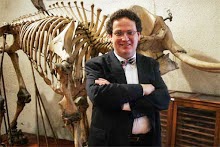I continue to wrestle with what to me is the inconceivable proposition that professional biologists would not see the importance of taxonomy. I have previously published the view that the neglect of taxonomy traces its roots to the rise of experimentalism in France and that this prejudice blossomed to full bloom about 1940 when Mayr and other Neo-Darwinists basically said that descriptive taxonomy is non-science and only population-level work ("population thinking" was the phrase, amazingly paralleled by contemporary misguided "tree thinkers" who misapply Hennig's methods below the species level) deserves respect as science. I still contend that this uncharitable read of history is right in broad strokes. Another pivotal issue involves our notions of what a species is.
To many population geneticists, ecologists, and molecular biologists, species are viewed as arbitrary bits of more or less continuous genetic variation that are set apart by subjective, blurry, or ephemeral gaps in variation. Such a view was an over reaction to Darwin's explanation of the importance and ubiquity of genetic variation and a frequent failure by non-taxonomists to distinguish between what Kevin Nixon and I called "traits" versus "characters". Traits are those attributes that vary within species; characters are those that are fixed and shared by 100% of members of a species. Process oriented biologists often point to a trait and proclaim "See! Species are variable" and therefore arbitrary. That bit of sophistry, however, does not undermine the objective status of good species or of good characters. The hallmark of taxonomy done well has always been the differentiation of those characters relevant to a particular level in the hierarchy whether species or some level of monophyly from those that vary and are therefore informative at some less inclusive level at best. It is intellectually dishonest to confound constant characters and variable traits and then denounce the objective existence of species. Pronouncements of species based on poorly selected or analyzed data is an indictment on bad taxonomy not the reality of species. This whole mess is tangled up too with a parallel confusion of what is or is not a character. Characters to a taxonomist are steeped in theory and hypotheses. The character backbone is constantly distributed among all vertebrate species, yet backbones do not look alike; cf. the backbone of a mouse and a giraffe, for example. The length or number of vertebrae may be informative at other levels, but at the level of Vertebrata the character "backbone" is a theoretical abstraction for which there are many instantiations. For a superb explanation of the theoretical underpinnings of characters in taxonomy, see Norm Platnick's seminal 1979 "transformation" paper in Systematic Zoology.
Reversing the bias against taxonomy so that we can get on with species exploration to prepare science and society to meet the biodiversity crisis may not be possible until we confront theoretical issues related to characters and species. If I were convinced that species were arbitrary, I would have little respect for taxonomy either. We must debunk this myth that is based on both malicious confusion --- I am convinced that Mayr who had done taxonomy deliberately chose traits or characters for a particular argument, pretending not to understand the distinction --- and a couple generations of students being indoctrinated into this false view that species are not real and taxonomy, thereby, not science.
Asking experimental biologists to unlearn what they have been taught about characters, species, and taxonomy will be far more difficult than it would have been to educate them about such issues to begin with. As Mark Twain said, "It ain't what you don't know that gets you into trouble. It's what you know for sure that just ain't so.”
Subscribe to:
Post Comments (Atom)










No comments:
Post a Comment